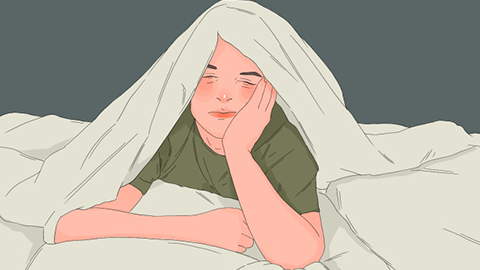Why do I feel irritable every night around ten o'clock?
Feeling irritable around 10 p.m. every night may be caused by circadian rhythm disturbances, pre-sleep neural excitement, anxiety disorder, hyperthyroidism, or menopausal syndrome. Adjusting sleep habits, relaxing the mind and body, and medical treatment can help alleviate symptoms. If irritability persists or worsens, or is accompanied by insomnia or palpitations, prompt medical evaluation is recommended.
1. Circadian Rhythm Influence: Hormone levels fluctuate at night, and in some individuals, cortisol does not decrease normally in the evening, leading to mood swings and irritability at a consistent time each night. It is recommended to maintain a regular sleep schedule, avoid staying up late, stay away from electronic devices one hour before bedtime, and keep the sleeping environment quiet.
2. Pre-Sleep Neural Excitement: Unreleased stress during the day or excessive thinking about trivial matters before bed can keep the brain's nervous system overactive, causing irritability. Listening to soothing music, soaking feet in warm water, and practicing deep breathing before bedtime can help relax the mind and body.

3. Anxiety Disorder: Chronic psychological stress can lead to neurotransmitter imbalances. At night, the ability to regulate emotions declines, making individuals prone to irritability at specific times, often accompanied by restlessness and difficulty falling asleep. Patients may take medications such as paroxetine hydrochloride tablets, sertraline hydrochloride tablets, or lorazepam tablets under medical supervision to relieve symptoms.
4. Hyperthyroidism: Excessive secretion of thyroid hormones increases nervous system excitability, with symptoms more pronounced at night. This may manifest as irritability around 10 p.m., along with palpitations, heat intolerance, and excessive sweating. Treatment may include medications such as methimazole tablets, propylthiouracil tablets, or propranolol tablets, taken under a doctor’s guidance.
5. Menopausal Syndrome: Fluctuating hormone levels affect autonomic nervous system function, and significant hormonal changes at night can trigger irritability at consistent times, accompanied by hot flashes, night sweats, and mood swings. Patients may take medications such as nylestriol tablets, oats extract tablets (guweisu), or vitamin B1 tablets as directed by a physician to improve symptoms.
Maintain a regular sleep schedule and ensure sufficient sleep, eat a light and balanced diet rich in fruits and vegetables, engage in moderate physical activities such as walking or yoga, and learn techniques for emotional self-regulation to remain calm and manage stress effectively.




